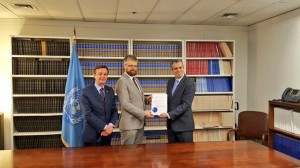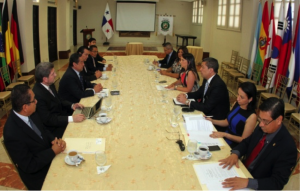

Our purpose: Promoting peace through criminal justice – preventing crimes of aggression
Through the United Nations Charter, States have expressed their commitment “to save succeeding generations from the scourge of war”. They have agreed to renounce the illegal threat or use of force, and to settle their disputes “by peaceful means in such a manner that international peace and security, and justice, are not endangered”. States have the legal duty to abide by this commitment and the UN Security Council has the primary responsibility to enforce it.The Nuremberg Trials made it clear that criminal justice also has an important role to play for the promotion of peace and the deterrence of acts of aggression – though it remained limited and theoretical for many decades thereafter. With the 2010 Kampala amendments to the Rome Statute of the International Criminal Court, States Parties created a new mechanism to enforce the most important rule of international law: the prohibition of the illegal use of force under the United Nations Charter. This website is dedicated to making accountability a reality.
News
The Republic of Kenya is first State Party to lodge declaration of non-acceptance of ICC jurisdiction over the crime of aggression: Pursuant to article 15 bis (4) of the Rome Statute, a State Party can declare that it does not accept ICC jurisdiction regarding the crime of aggression by lodging a declaration with the ICC Registrar. On 30 November 2015, Kenya lodged their declaration of non-acceptance with the Registrar: https://www.icc–cpi.int/iccdocs/other/2015_NV_Kenya_Declaration_article15bis-4.pdf
 The State of Palestine key 30th ICC State Party to ratify Kampala Amendments: On 26 June 2016, the State of Palestine deposited its instrument of ratification of the Kampala Amendments. With 30 ratifications achieved, all that is needed now is for ICC States Parties to take an activation decision on the Court’s jurisdiction over the crime of aggression in 2017. This is a historic day! We are now one step closer to a permanent system of accountability at the international level for this supreme crime.
The State of Palestine key 30th ICC State Party to ratify Kampala Amendments: On 26 June 2016, the State of Palestine deposited its instrument of ratification of the Kampala Amendments. With 30 ratifications achieved, all that is needed now is for ICC States Parties to take an activation decision on the Court’s jurisdiction over the crime of aggression in 2017. This is a historic day! We are now one step closer to a permanent system of accountability at the international level for this supreme crime.
 Iceland ratifies Kampala Amendments: On 17 June 2016, Iceland deposited its instrument of ratification of the Kampala Amendments with the Secretary-General of the United Nations. Its parliament had approved the ratification earlier the same month. Iceland is the 29th State Party to the Kampala Amendments. With several other domestic ratification processes complete or nearing completion, we are very close to reaching the milestone of 30 ratifications this year. Mr. Oláfur Ragnar Grímson, President of Iceland: “I am proud of being a part of this important decision for my country, which illustrates its commitment to international justice and the strong role of the Rule of Law. I would like to call on all States that have not yet done so, to continue ratifying the Kampala Amendments in order to not only reach the milestone of 30 ratifications necessary for the activation of the Amendments but also to demonstrate the respect for the territorial integrity of States and peace and security around the world. I firmly believe that my country’s step in this direction will serve as an inspiration to all the States to take the initiative and join the group of countries that are sending a strong message that the illegal use of force has no role in international relations and those who launch aggressive wars shall be held accountable.”
Iceland ratifies Kampala Amendments: On 17 June 2016, Iceland deposited its instrument of ratification of the Kampala Amendments with the Secretary-General of the United Nations. Its parliament had approved the ratification earlier the same month. Iceland is the 29th State Party to the Kampala Amendments. With several other domestic ratification processes complete or nearing completion, we are very close to reaching the milestone of 30 ratifications this year. Mr. Oláfur Ragnar Grímson, President of Iceland: “I am proud of being a part of this important decision for my country, which illustrates its commitment to international justice and the strong role of the Rule of Law. I would like to call on all States that have not yet done so, to continue ratifying the Kampala Amendments in order to not only reach the milestone of 30 ratifications necessary for the activation of the Amendments but also to demonstrate the respect for the territorial integrity of States and peace and security around the world. I firmly believe that my country’s step in this direction will serve as an inspiration to all the States to take the initiative and join the group of countries that are sending a strong message that the illegal use of force has no role in international relations and those who launch aggressive wars shall be held accountable.”
Photo: Ambassador of Italy to the UN, Sebastiano Cardi, Ambassador of Iceland to the UN, Einar Gunnarsson and the Chief of the UN Treaty Section Santiago Villalpando on 17 June 2016.
Legal scholars debate crime of aggression amendments: Last week, Professors Claus Kreß and Harold Koh led a spirited discussion on some of the details of the Kampala Amendments in New York. They discussed the activation of the ICC’s jurisdiction over the crime of aggression in 2017, including the precise extent of the Court’s jurisdiction as well as the question of humanitarian intervention. Don’t miss the arguments raised by Stefan Barriga, Liechtenstein’s Deputy Permanent Representative to the UN and co-drafter of the Kampala Amendments, at 1:01:15, as to how some of the concerns raised can be met with pragmatic solutions – especially in light of the fact that the amendments establish a very limited, consent-based jurisdictional regime. Carrie McDougall, Legal Adviser of the Australian Mission to the UN, at 1:10:15, noted that for those States that have ratified the amendments, there are no jurisdictional ambiguities – meaning that ratifying the amendments would help solve any remaining questions in this regard.
The International Criminal Court and the Crime of Aggression from German Center for Research and I on Vimeo.
El Salvador ratifies amended version of the Rome Statute: On 3 March 2016, Hugo Roger Martinez Bonilla, Foreign Minister of El Salvador, deposited his country’s instrument of ratification of the amended Rome Statute. El Salvador thus became the first country to ratify the Statute and the Kampala Amendments at the same time – it will be the 124th State Party to the Rome Statute and the 28th State Party to the Kampala Amendments. El Salvador’s ratification once again underscores Latin America’s strong commitment to the International Criminal Court – all but one Central American States have now joined – all of South America is already within the Court’s jurisdiction. The Campaign is hopeful that future States joining the Rome Statute will follow El Salvador’s lead and ratify the amended Statute. With several other domestic ratification processes complete or nearing completion, we remain on track to achieve the milestone of 30 ratifications in the first half of this year.
Photo: Hugo Roger Martinez Bonilla, Foreign Minister of El Salvador deposits his country’s instrument of ratification. Stephen Mathias, Assistant-Secetary-General for Legal Affairs of the United Nations, receives the instrument.
 Macedonia ratifies Kampala Amendments, adopts implementing legislation: On 1 March 2016, Macedonia (FYROM) deposited its instrument of ratification of the Kampala Amendments with the Secretary-General of the United Nations. Its parliament had approved both the ratification and the adoption of implementing legislation in early February. Macedonia is the 27th State Party to the Kampala Amendments. With several other domestic ratification processes complete or nearing completion, we remain on track to achieve the milestone of 30 ratifications in the first half of 2016.
Macedonia ratifies Kampala Amendments, adopts implementing legislation: On 1 March 2016, Macedonia (FYROM) deposited its instrument of ratification of the Kampala Amendments with the Secretary-General of the United Nations. Its parliament had approved both the ratification and the adoption of implementing legislation in early February. Macedonia is the 27th State Party to the Kampala Amendments. With several other domestic ratification processes complete or nearing completion, we remain on track to achieve the milestone of 30 ratifications in the first half of 2016.
 Proposal presented to implement Kampala Amendments in Panama: On 2 February 2016, the Bar Association of Panama presented a Draft Statute implementing the Kampala Amendments into the Panamanian Criminal Code to the Ministry of Foreign Affairs. Inclusion of the crime of aggression in the criminal code would be an important step towards the ratification of the amendments, a process on which Panama has been actively working (see our Status Report).
Proposal presented to implement Kampala Amendments in Panama: On 2 February 2016, the Bar Association of Panama presented a Draft Statute implementing the Kampala Amendments into the Panamanian Criminal Code to the Ministry of Foreign Affairs. Inclusion of the crime of aggression in the criminal code would be an important step towards the ratification of the amendments, a process on which Panama has been actively working (see our Status Report).
For more information, see the Ministry of Foreign Affairs’ press release (Spanish).
Photo: President of the Bar Association of Panama presents draft Statute to for the implementation of the Kampala Amendments to the Vice Minister of Foreign Affairs. Courtesy of the Ministry of Foreign Affairs of Panama.
 Crime of aggression now outlawed in Austria: On 1 January 2016, Austria’s amended criminal code entered into force, for the first time defining the crime of aggression as an offence (article 321k). The definition of the crime is based in large parts on the definition of Kampala. The crime of aggression is punishable in Austria with a prison term of five to ten years, provided that the crime either originates in Austria or has Austria as its target. The code also allows for the prosecution of crimes of aggression committed without such a link, provided the perpetrator is found on Austrian territory and cannot be extradited for criminal prosecution.
Crime of aggression now outlawed in Austria: On 1 January 2016, Austria’s amended criminal code entered into force, for the first time defining the crime of aggression as an offence (article 321k). The definition of the crime is based in large parts on the definition of Kampala. The crime of aggression is punishable in Austria with a prison term of five to ten years, provided that the crime either originates in Austria or has Austria as its target. The code also allows for the prosecution of crimes of aggression committed without such a link, provided the perpetrator is found on Austrian territory and cannot be extradited for criminal prosecution.
The current version of the Austrian criminal code is available online (German).
